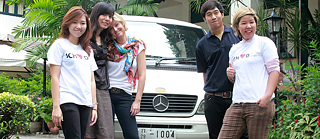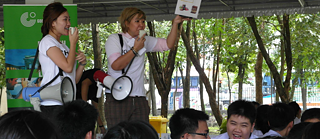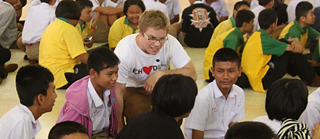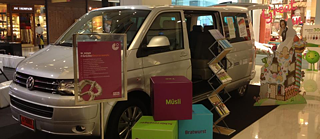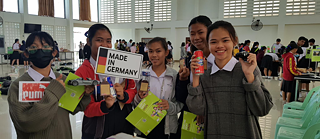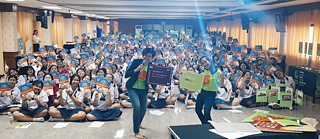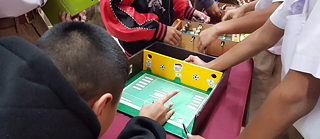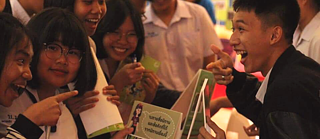In VW Bulli into the shopping mall
A review of ten years of Deutschmobil

Back in 2011, a team of four from the Goethe-Institut Bangkok went on a road trip for the first time to enthuse students for the German language. Three staff members tell us about its beginning and look ahead to the future of German language learning.
How did the idea of the Deutschmobil come into being?
Timo Kozlowski: I was engaged for over 16 years at the Goethe-Institut Bangkok and was in charge of implementing the initiative “Schools: Partners for the Future”. At that time, we noticed that every year fewer and fewer students decided to learn German and we wondered how we could make this subject at in Thai schools more attractive.
The concept of the Deutschmobil originated from the colleagues from Wellington, New Zealand and we adapted it for Thailand. We wanted to offer a kind of infotainment show about Germany and also a trial course. German is widely regarded as a difficult language. This trial course is supposed to disprove this cliché,
and to show that people can learn how to introduce themselves and ask someone their name within 15 minutes.
What can you recall about the first Deutschmobil tour?
Timo: The implementation was, of course, still in its infancy and we used the request from a school in Khon Kaen, in the northeast of Thailand as our first tryout. Almost all of the materials were handmade. We rent a van, loaded it with all the equipment, and four of us drove to Khon Kaen to run the program.
Prewsulee Nikrothanon: I still remember the first tour distinctly. At the time I was totally anxious, whether all of the materials would fit into the van. And they did. We managed to cram boxes, suitcases, metal stands, tables, cupboard cutouts, stereos, megaphones, a map, a fan and even a marquee into it.
In the schools, we were warmly welcomed by the teachers. In spite of the excitement, we pulled off the first show with 150 students. Later on the same day we managed to ran another show with nearly 400 participants. They laughed a lot and were being very cooperative. We really had a very good time.
How has the Deutschmobil evolved over the years?
Timo: Very early on it proved true that this kind of format worked. We used experiences that we had gained to develop the program as well as the materials. The car itself served to promote Germany, and a sales partner of Volkswagen made a VW Bulli available for us in the first years at no charge.
Päng: The pandemic has changed our entire work. Since we are not allowed to organize activities in the schools for the time being, we have developed online activities instead such as the Goethe Goes Green Challenge on TikTok, the Goethe Goes Green Online Diary or the Digital International Deutscholympiade. We have learned to reach the students by other kinds of means.
How has the situation in the schools changed in regard to German language learning in the last ten years? How do you asses its future in Thailand?
Prasanee Sinlapanawin (Miao): In Thailand the teaching of German has drastically been modernized in recent years. A lot of teachers have gone into retirement. As a result of our cooperation with the Thai Ministry of Education, we managed to bring many young people on broad. That is why the number of German learners has increased again. At that time, these young teachers played an important role in development of German language teaching. Therefore, the Goethe-Institut also gives them support for their further training.
Päng: Due to the rapid development of various technologies, the competition between German and other languages gets more intense. The influence from East Asian countries to pop culture products such as Films, music or comics has been profoundly growing, thereby generating interest in their languages as well. At the same time, many young people are able to quickly obtain information about German culture on the internet, and to convince themselves with the benefits of learning German.
Miao: In Thailand German as foreign language has gained increasing popularity in recent years. At school, students can learn German as a core subject, a minor subject and also an elective subject. Through the cooperation between the Goethe-Institut and local institutions such as The Office of The Basic Education Commission (OBEC) or The Thai German Teachers' Association, the teaching of German language in Thailand is expected to develop further. There is still a lot of potential.
What is your personal highlight?
Päng: In the school time, one colleague from the cultural department of the Goethe-Institut decided to learn German because of the Deutschmobil, where she discovered the German culture, and even got a job at the Institute in the end. That is for me the most beautiful highlight.
Timo: An unforgettable recollection that will remain in my memory: The Chamber of Commerce celebrated a jubilee, and, on the occasion, organized an exhibition about Germany in a shopping mall. The Goethe-Institut was involved with activities of the Deutschmobil. One of the highlights of mine was how I drove the VW Bulli in the mall for the installation.
The glass doors had been opened and I was having a few millimeter space on the left and the right sides next to the folded wing mirrors. I chugged along the crazily expensive shop windows at walking pace.
I had never experienced something like that before. Hence, with the Deutschmobil we absolutely learn how to drive – to unusual places as well!
Contact Persons
Prasanee Sinlapanawin (Miao) is the project coordinator of the Deutschmobil in collaboration with the German Teachers Support Services of the Goethe-Instituts Bangkok.
Prewsulee Nikrothanon (Päng) has been teaching German at the Goethe-Institut Bangkok since 2009. Together with her colleague Prasanee Sinlapanawin, she coordinates the Deutschmobil in Thailand.
Timo Kozlowski was the representative of the initiative School: Partners of the Future (PASCH) for more than 16 years. Today he is working as Expert for Online Learning at the Goethe-Institut Head Office in München
